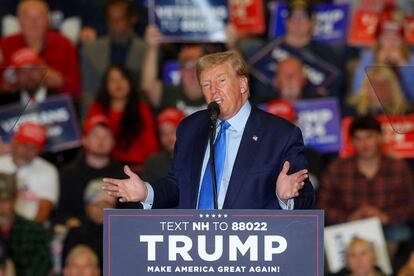New Hampshire defies national Democrats’ new calendar and sets the presidential primary for Jan. 23
State law requires New Hampshire’s Republican and Democratic primaries to be held at least seven days before any similar contest and gives the secretary of state sole authority to set the date

New Hampshire’s secretary of state on Wednesday scheduled the state’s presidential primaries for Jan. 23, 2024, extending its century-old streak of going first despite national Democrats’ efforts to overhaul the nominating calendar.
State law requires New Hampshire’s Republican and Democratic primaries to be held at least seven days before any similar contest and gives the secretary of state sole authority to set the date. Like his predecessor did for decades, Secretary of State David Scanlan waited for the dust to settle in other states before announcing his decision.
He chose as his backdrop the Statehouse’s Hall of Flags, which displays more than 100 blood-stained and bullet-ridden battle flags carried by New Hampshire soldiers in the Civil War and onward. Calling it a memorial to those who fought for freedom and democracy, Scanlan said New Hampshire still represents those values.
“The government and political climate we have created here reflects the reason for their sacrifice and courage,” said Scanlan. “In today’s society, it seems that we are quick to eliminate traditions and ignore them. But I would like to think that 100 years from now, the people of this country will really be glad that we kept this one.”
Republicans will kick off the nominating process with the Iowa caucus on Jan. 15, 2024. New Hampshire’s primary eight days later will be a crucial opportunity for GOP candidates to show they can remain competitive against former President Donald Trump, the early front-runner for their party’s presidential nomination+. Former New Jersey Gov. Chris Christie in particular has put New Hampshire at the center of his strategy.
Iowa’s Democrats also will caucus on Jan. 15, 2024, but not release the presidential results immediately to comply with new party rules sought by President Joe Biden, who argued Black and other minority voters should play a larger, earlier role. Iowa and New Hampshire are each more than 90% white.
But Scanlan said that using racial diversity as “a cudgel” in a bid to rearrange the presidential nominating calendar sets “an ugly precedent.”
“At what point does a state become too old, or too wealthy, or too educated, or too religious to hold an early primary?” he said in a news conference announcing the date.
The Democratic National Committee approved a new calendar with a primary in South Carolina, which has a large Black population, on Feb. 3, 2024, followed three days later by Nevada. The schedule also moves Michigan into the group of early states voting before Super Tuesday on March 5, 2024, when most of the rest of the country holds primaries.
There will be 24 Republicans on the ballot in New Hampshire and 21 Democrats. Biden won’t appear on the New Hampshire ballot and isn’t planning to campaign there, though some of the state’s top Democrats are organizing a write-in campaign backing his reelection bid. Scanlan called Biden’s decision a “sad choice.”
“Maybe he will win because people in the state want to write his name on the ballot, but maybe he won’t,” Scanlan said after the news conference.
The Republican field has begun to consolidate since former Vice President Mike Pence and South Carolina Sen. Tim Scott dropped out. Christie, Florida Gov. Ron DeSantis, former South Carolina Gov. Nikki Haley and entrepreneur Vivek Ramaswamy are vying to emerge as the chief Trump opponent.
Republican Gov. Chris Sununu called New Hampshire “a bottom up state.”
“We really are that state where you don’t need name ID, you don’t need money, you just need to come out and earn it person to person,” he said.
Sign up for our weekly newsletter to get more English-language news coverage from EL PAÍS USA Edition
Tu suscripción se está usando en otro dispositivo
¿Quieres añadir otro usuario a tu suscripción?
Si continúas leyendo en este dispositivo, no se podrá leer en el otro.
FlechaTu suscripción se está usando en otro dispositivo y solo puedes acceder a EL PAÍS desde un dispositivo a la vez.
Si quieres compartir tu cuenta, cambia tu suscripción a la modalidad Premium, así podrás añadir otro usuario. Cada uno accederá con su propia cuenta de email, lo que os permitirá personalizar vuestra experiencia en EL PAÍS.
¿Tienes una suscripción de empresa? Accede aquí para contratar más cuentas.
En el caso de no saber quién está usando tu cuenta, te recomendamos cambiar tu contraseña aquí.
Si decides continuar compartiendo tu cuenta, este mensaje se mostrará en tu dispositivo y en el de la otra persona que está usando tu cuenta de forma indefinida, afectando a tu experiencia de lectura. Puedes consultar aquí los términos y condiciones de la suscripción digital.








































